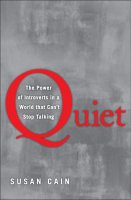 Quiet: The Power of Introverts in a World that Can't Stop Talking by Susan Cain (Crown, 2012)
Quiet: The Power of Introverts in a World that Can't Stop Talking by Susan Cain (Crown, 2012)
I waited a long time for my name to percolate to the top of our library's waiting list for Quiet. In another example of God's amazing sense of humor, I was able to pick up the book on my way home from dropping the Daleys at the airport. Returning to a house no longer ringing with the sound of grandchildren was at the time altogether too much quiet for me. Being able to bury myself in the book did help assuage the sense of loss, however.
I'm tempted to say that Quiet is by far the best of all the books I've read on introversion, though that may only be because it's the third, and I have the advantage of having read others. Introverts in the Church made me cry because it was the first, revealing to me the value of character traits I've been pressured to suppress all my life, but it is not particularly well written, and is a bit strident for sharing with extroverts.
Although I found the second book overly psycho-therapeutic, I learned from The Introvert Advantage some of the physical differences between the brains of introverts and those of extroverts, and some advice for understanding (and helping) both introverted and extroverted children. Quiet takes that ball and runs a lot further with it.
It helps that the book is well written, enabling me to concentrate on the content without being distracted by the form. The author is also more even-toned in her approach, highlighting the contributions of introverts, yes, but at the same time emphasizing the value of both temperament types. She's much easier on extroverts than some writers whose scars from growing up in an extrovert-dominated world are more visible. Nonetheless, I can't unequivocally recommend the book for all extroverts. If you're an insecure extrovert looking for affirmation of your own temperament, you won't find much help here. If you think the problem with the world is that most people are not extroverted enough, Cain is not singing your song. But if you yearn to understand, appreciate, and support the introverts in your life—especially if you have an introverted spouse or child who frustrates or puzzles you, or if you're an employer desiring to create the most productive work environment for employees of diverse temperaments, don't miss Quiet.
Cain deliberately broadens her use of the terms "extrovert" and "introvert" from the popular consideration of whether one is renewed by crowds or solitude.
This book is about introversion as seen from a cultural point of view. Its primary concern is the age-old dichotomy between the "man of action" and the "man of contemplation," and how we could improve the world if only there were a greater balance of power between the two types.
Actually, her brush is broader still, which to my mind makes it worthwhile reading "yet another book on introverts": She covers other, related personality traits, along with how they interact with intro- and extro-version. This could profitably have been seven books rather than one. Which is a bit frustrating, I'll admit, as it seems she is just getting started on an interesting subject when she veers in another direction.
Quiet is a popular book, which means I had only two-thirds the normal time to keep this library copy, with no hope of renewal, and it was due yesterday. So for the remainder of this post you'll get a somewhat random collection of a few of the points that caught my eye.
The 20th century was not a good time for introverted children. Reading about the development of the Cult of Personality and the psychological concept of the Inferiority Complex helps explain why I provoked comments in my father's journals (which I read many years later) on the order of, "I sure wish Linda were more sociable." Never mind that my parents were as introverted as I am—they wanted better for their children.
[C]hild guidance experts of the 1920's set about helping children to develop winning personalities. Until then, these professionals had worried mainly about sexually precocious girls and delinquent boys, but now psychologists, social workers, and doctors focused on the everyday child with the "maladjusted personality" ... The experts advised parents to socialize their children well and schools to change their emphasis from book-learning to "assisting and guiding the developing personality." Educators took up this mantle enthusiastically. ... Well-meaning parents of the midcentury agreed that quiet was unacceptable and gregariousness ideal for both girls and boys. Some discouraged their children from solitary and serious hobbies, like classical music, that could make them unpopular. They sent their kids to school at increasingly young ages, where the main assignment was learning to socialize. Introverted children were often singled out as problem cases.
Maybe I'd have been better off growing up in Taiwan, as in this quote from a present-day American high school student whose parents are from that country. (More)
I remember when Google was the new kid on the block, and I deliberately chose to use it as my primary search engine, simply because Google was the underdog. (Does anyone else remember AltaVista?) Well, no more. Now, I'd gladly eschew Google simply because the company is so powerful. But I can't.
Because Google is the best. Hands down. (Bing's not bad, but there's no point in avoiding one big company just to support another.)
When my husband has a question about one of his company's products, and searches the official company sites, sometimes we'll race: Usually I can find more information, faster, through Google. More and more often, if I need help on an issue I'm having with a particular piece of hardware or software, I skip the product's manual and official "help" feature and go straight to Google—because it does a better job.
Today we wanted the address of a friend from a previous church. We had been told that there was a directory online, but after a frustrating, fruitless time on their website, I resorted to Google, which quickly led me to the needed information.
It's not a comfortable situation, being so dependent on one, powerful company, be it Microsoft or no-longer-the-underdog Google. Mac and Linux users are a vocal and proud "we few, we happy few, we band of brothers" against Microsoft, but who provides a similar challenge to Google?
We need a paradigm shift, if only to provide some competition.
I have so many things to write about, but am feeling a time crunch at the moment. Just so you know I haven't forgotten you altogether, you get someone else's comments on homeschooling, in the form of a First Things article by Sally Thomas. (H/T Conversion Diary). Warning: it may be a little intimidating if you happen to be feeling a bit insecure about your own homeschooling days. But it's worth reading for the inspiration.
In recent years, as homeschooling has moved closer to the mainstream, much has been said about the successes of homeschooled children, especially regarding their statistically superior performance on standardized tests and the attractiveness of their transcripts and portfolios to college-admissions boards. Less, I think, has been said about how and why these successes happen. The fact is that homeschooling is an efficient way to teach and learn. It's time-effective, in that a homeschooled child, working independently or one-on-one with a parent or an older sibling, can get through more work or master a concept more quickly than a child who's one of twenty-five in a classroom.
To my mind, however, homeschooling's greatest efficiency lies in its capacity for a rightly ordered life. A child in school almost inevitably has a separate existence, a “school life,” that too easily weakens parental authority and values and that also encourages an artificial boundary between learning and everything else. Children come home exhausted from a day at school—and for a child with working parents, that day can be twelve hours long—and the last thing they want is to pick up a book or have a conversation. Television and video games demand relatively little, and they seem a blessed departure from what the children have been doing all day.
At home we can do what's nearly impossible in a school setting: We can weave learning into the fabric of our family life, so that the lines between “learning” and “everything else” have largely ceased to exist. The older children do a daily schedule of what I call sit-down work: math lessons, English and foreign-language exercises, and readings for history and science. The nine-year-old does roughly two hours of sit-down work a day, while the twelve-year-old spends three to four hours. But those hours hardly constitute the sum total of their education.
[W]hat looks like not that much on the daily surface of things proves in the living to be something greater than the schedule on the page suggests, a life in which English and math and science and history, contemplation and discussion and action, faith and learning, are not compartmentalized entities but elements in an integrated whole.
I've been experimenting with Memrise for several days—long enough to conclude it merits a mention.
Memrise is a vocabulary review system that specializes in languages, of which there are an incredible number, from French to Quechua to Klingon! (Alas, no Swiss German, no doubt hampered by the lack of an official written form.) There are other subjects, as well, but not many yet, and they are not well developed. The Periodic Table course, for example, would do better not reversing the "o" and the "u" in fluorine, and settling on either of the two acceptable spellings of the element Al, instead of compromising with "Alumnium." (Or is that a new element, named after all college graduates?)
I'm loving the Introductory German! My favorite language course is still Pimsleur, which along with Hippo gets the correct sound and feel of the language and its structure into my brain. But I also need a way to build up vocabulary, and Memrise is the best I've found so far. The vehicle is a simple "garden" system: new words are seeds, and through practice you sprout them, help them grow, "harvest" (more like transplant) them to long-term memory, and water them to keep them healthy. E-mail reminders bring you back to your "garden" at varying intervals—short for recently-learned words, longer for ones you know better—so you don't lose what you've learned.
It's easy to use and kind of fun. I find that I'm picking up vocabulary pretty well so far, though I do wonder who decided which words to introduce first. I mean, die Bundesrepublik? "Federal Republic" is not exactly a term I use every day. Or how about der Mülleimer? Dustbin? Dustbin? Dustbins are things people in the English novels I love to read are always "tipping" things into, but I'm sure I've used the term fewer times than Federal Republic. And is blöd (stupid) really an essential vocabulary word? Still, in addition to these oddities there are more useful terms, such as das Haus (house), vielleicht (maybe), and der Name (name). And I've finally caught the difference between der Staat (state) and die Stadt (city).
Unfortunately, I can't make the audio work in Firefox, and so must use IE or Chrome if I want to hear the words pronounced. That's something I find very valuable, not only for understanding and speaking, but because having heard the sound of a noun I'm much more likely to be able to remember whether it's die, der, or das, something I always have trouble with. I'm beginning to think of the article and the word as one entity, which of course will get me into trouble when I have to worry about inflection, but I'll climb that hill when I get to it.
It's also German German, and so uses the Eszett instead of the Swiss double "s." However, it accepts the double "s" when I have to type in an answer, so I'm fine with it. Letters with an umlaut are easy to enter, via either a mouse click or the Windows U.S. International keyboard (which I prefer because it is faster).
Here's hoping I manage to stick with the program, and not lose everything when I go on vacation....
So, the CDC wants all of the "baby boom" generation tested for hepatitis C, in a move reminiscent of school teachers who punish the whole class for the misbehavior of the few. I was planning on simply refusing the test, should our doctor suggest it, but now I have a better answer.
The Big Red Bus was at our church today, so we hopped on and donated, after the Eucharist. (Blood in, blood out.) As it happens, testing for hepatitis C is part of the "mini-physical" you get when you donate blood. Now if the doctor asks, I can say, "been there, done that." Several times over, as a matter of fact.
Study finds coffee-drinkers live longer
The bad news? Lots of cream and sugar could negate the effect.
The good news? Enjoy your coffee guilt-free. At least the coffee helps negate the effect of the cream and sugar. :) And remember, stress and guilt are bad for you, too!
Florida gets all too much press for crazy happenings, so it's about time another state took the spotlight. Was it another school shooting that put Cascade High School in Hendricks County, Indiana, in the headlines? Nope. The newsworthy offense was a senior prank involving the deadly ... Post-It note! (H/T Free-Range Kids) Actually, the offense was on the part of the school administrators, who so far have suspended over 50 students, either for participating in the prank or for protesting the school's draconian response.
For years, MIT and Caltech have known that inventive, harmless pranks are a sign of an intelligent, creative student body. I think we can guess what schools the administrators did NOT graduate from—though maybe the helpful janitor (Frazz?) did.
Until Janet wrote a post that tops everything, this celebration of mothers from Lenore Skenazy was my favorite Mother's Day article. It's still great. I present some excerpts, with love, for all of my favorite mothers.
Time out from America’s favorite spectator sport: Mommy bashing. Mommies who “ignore” their kids. Mommies who “smother” their kids. Mommies who do what mommies have done since the beginning of time—their gosh-darn best. And yet, according to some onlooker somewhere (often one with air time to fill), that’s just not good enough.
We worry that one false move—a harsh word, a broken promise, perhaps a non-Paul Newman sandwich cookie—could cause a lifetime of pain. This worry is reinforced by a tsunami of parenting “resources” telling moms how to do everything just right: the right books, words, classes. I’ve seen whole articles on which sand toys to buy. The corollary is blame: If moms don’t do all those things (and spend all that time and waste all that money), their kids will be losers. And it’s all their fault.
That message is why mothers are getting the short end of the rattle. It’s a message that says there’s some secret recipe for raising great kids and anyone not following the recipe is doing it WRONG.
But you know what? Most moms, whether working or not, breastfeeding or not, are doing a great job. They hug their children. They kiss the boo-boo, they get the kids fed. And if it’s a Hot Pocket instead of broccoli rabe…so what?
There ISN’T a secret recipe for childrearing, there’s only the basic ingredient: Love. Most moms have it in spades. It’s who they are. So don’t keep telling them what they’re doing wrong.
Thank them for getting the biggest thing right.
Permalink | Read 2500 times | Comments (2)
Category Children & Family Issues: [first] [previous] [next] [newest]
 Luke's Story by Tim LaHaye and Jerry B. Jenkins (Putnam Praise, 2009)
Luke's Story by Tim LaHaye and Jerry B. Jenkins (Putnam Praise, 2009)
Luke's Story, the second book of LaHaye and Jenkins' Jesus Chronicles, uses the Bible, extra-biblical sources, and a lot of imagination to tell a reasonably credible story about the author of the Gospel of Luke. I found it more interesting than Mark's Story, though it suffers from many of the same defects. It's still seems like cheating that the authors get so much of their word count by lifting passages straight from the Bible, and their denominational slant is annoying. Worse, it lacks a first-century feel. I'm not sure I'd recognize an authentic setting, but I know the characters are spouting modern language, theology, and attitudes. Somehow I doubt that first-century worship looked quite so much like a modern American Baptist service....
However, there's more "story" to this book than there was to Mark's Story, which made it more enjoyable to read.
It was almost an idyllic scene: Three adults, eight children—four boys, four girls, ages 9, 8, 7, 5, 3, 3, 14 months, and 6 months—and one playground all to ourselves.
Well, almost all to ourselves. As the children happily ran back and forth across the grounds, it was more than a little annoying to remind them to watch out for the maintenance cart that came back again and again to ... to what?
The first time, the driver was apparently cleaning up branches from a recent storm, though he spent most of his time making worried comments about the exuberantly-climbing 14-month-old and glaring at the three adults who clearly weren't doing their duty in keeping her off the dangerous equipment. "There's an open space up there she could fall through, you know!" Yep, she could have fallen, I suppose, but she's part monkey, part mountain goat, and part bulldozer, so none of us saw any reason to spoil her fun. "Open space" or not, this playground is as safe as it can get without being of no use at all. Since the days when our children played there, we've lost the merry-go-round, the high, curly slide, and a lot of climbing equipment that was far more interesting ("dangerous") than that which replaced it.
The boys had ridden their scooters into the park, and dropped them right on the sidewalk as they ran off to play on the equipment. We'd left the scooters where they lay, because no one else was in the park to be bothered by them. When the maintenance cart came by, I quickly moved them out of his way. "Do you know whose scooters those are?" "Yes; they're ours." "Riding scooters in the park is forbidden." "Okay, I'll let the kids know." We meekly obeyed, though I can't imagine why he found it necessary to enforce the rule. Did I mention we were the only ones in the park?
Finally, the man drove away. But like the famous cat, he kept coming back. Driving slowly through the park, peering suspiciously at the children's antics, then leaving, only to repeat the process a few minutes later. In other circumstances I would have been tempted to call the police! But I'm sure he only meant well, and just wanted to be available when one of the frolicking youngsters suffered an injury, since the adults were clearly irresponsible, chatting away among themselves while the children chased each other up and down and all around.
Everyone had a wonderful time—except possibly the maintenance man, and who knows? maybe he was satisfied in a perverse sort of way for having prevented a scraped-knee scooter injury. But the experience did leave me slightly disturbed.
Reading the Free-Range Kids blog, I've heard plenty of stories of how schools, governments, playgrounds, social service agencies, and other institutions have joined "helicopter" parents in a culture of fear that deprives today's children of the opportunities they need to develop into strong, competent, independent adults. But this was my first personal experience with the phenomenon, and it was somewhat of a shock.
Permalink | Read 2947 times | Comments (1)
Category Children & Family Issues: [first] [previous] [next] [newest] Everyday Life: [first] [previous] [next] [newest]
The materials: We bought a couple of posts and a second hammer, but the rest of the materials were scrounged or donated by neighbors.
The labor force: Jonathan, Noah, Faith, and Dad-o.
The experience: Priceless.
Video tour of the fort. Even Faith can climb up the ladder to the top, though she hasn't tried the Jump Line yet.
Permalink | Read 2934 times | Comments (7)
Category Everyday Life: [first] [previous] [next] [newest]
 No, We Can't: Radical Islam, Militant Secularism, and the Myth of Coexistence by Robert Stearns (Chosen, 2011)
No, We Can't: Radical Islam, Militant Secularism, and the Myth of Coexistence by Robert Stearns (Chosen, 2011)
I received this book for review under false pretenses, but it was my fault entirely. This was the blurb that caught my eye:
The world is shifting, and a war for world domination is raging between radical Islam, militant secularism and Judeo-Christianity. But what does it mean for you—and why should you care? With clarity and astonishing depth, Robert Stearns lays out the dire ramifications of this coming culture clash for Christians. Based on years of global outreach, he shows what believers can and must do. The tipping point in global culture is upon us. What role will you play?
Normally, words like "a war for world domination" wouldn't encourage me to pick up a book. But I thought this would be a word from the trenches, from one known for his care for the poor, the downtrodden, and the marginalized all over the world. I was eager to hear about "radical Islam" from one whose organization has experienced tragedy at the hands of the Taliban, yet continues to provide humanitarian aid to "all people, regardless of religion, race, ethnicity, or gender." I was expecting "he shows what believers can and must do" to focus on the need for more church involvement in fighting the causes of poverty and injustice worldwide. I was hoping to hear about World Vision International's experiences dealing with culture clashes, and was especially interested to hear the warnings of such a man about "dire ramifications of this coming culture clash." I wanted to know what led such a man, who claims we have the knowledge and ability to end most extreme poverty if only we had the will, to write a book entitled, "No, We Can't."
My mistake was in not checking up on the author. It turns out that the president of World Vision is Richard Stearns, while the author of this book is Robert Stearns. As far as I know, they are not related, and they certainly have different perspectives.
Having agreed to review the book, however mistakenly, I was obligated to read it. It's a pity that Robert Stearns' language is so strident and his logic sometimes shaky, because I think he has some good points; it's just too hard to sort the wheat from the chaff. (More)




